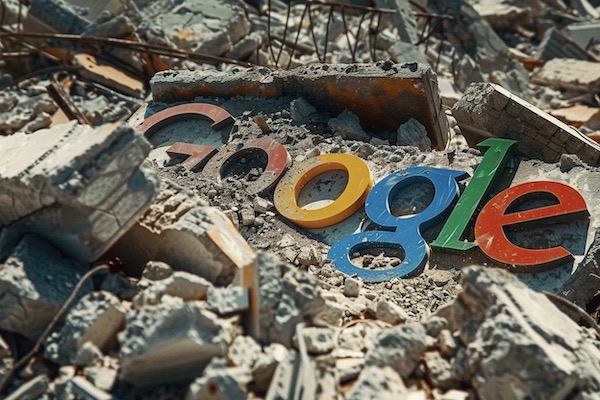Published on the 26/11/2024 | Written by Heather Wright

Debundling Google, Chrome and maybe Android…
Google parent company Alphabet could be forced to sell Chrome as part of measures the Department of Justice is pushing for.
The Department of Justice has argued that Alphabet must sell Chrome, share data and search results with rivals and even possibly sell its Android smartphone software in future, to restore competition in online search.
“The DOJ’s wildly overbroad proposal goes miles beyond the Court’s decision.”
The latest court action, to establish ‘remedies’, follows the August ruling of a US federal judge that Alphabet had broken the law with its monopoly over online search and related ads. The judge noted that Google, which controlled around 90 percent of the global search market in October and 95 percent on smartphones, had spent US$26.3 billion just in 2021 to maintain its search engine dominance and ensure it is the default search engine on both browsers and smartphones.
Used by more than three billion people worldwide, Chrome is a crucial part of Google’s advertising business, which accounted for 75 percent of the company’s revenue last quarter. The free search provides the user data to enable targeting capabilities. It’s also used to train the company’s algorithms and promote Google’s other services.
The DoJ proposals include barring Google from playing in the browser market for five years and restrictions on how it uses AI.
A ban on Google buying or investing in search rivals and potential entrants and search related ad products – and the divestiture within six months of ‘any such interests’ it currently owns – along with any rival query-based AI products or advertising technology is also requested.
The company should also be required to share data and search results with competitors.
“An effective remedy must also ensure that Google cannot circumvent the Court’s remedy by providing its search products preferential access to related products or services that it owns or controls, including mobile operating systems (eg Android), apps (eg YouTube) or Ai products (eg Gemini) or related data,” the DoJ proposal states
Despite laying out a similar litany of concerns over Andriod, the DoJ has stopped short of calling for an immediate divestiture of the Android mobile operating system, which it dubbed ‘the most straightforward solution’, but kept the option on the table.
Alternative ‘behavioural remedies’ would blunt Google’s ability to use its control of the Android ecosystem to favour its general search services and search text ad monopolies and limit the company’s ability to discriminate in favour of its own search and ads business, but would require ‘vigilance and oversight by the courts and plaintiffs’, returning to divestiture if measures fail to bring ‘meaningful’ relief in critical markets.
Kent Walker, Google’s chief legal officer, says the DoJ is pushing a ‘radical interventionist agenda that would harm Americans and America’s global technology leadership’, with the ‘wildly overbroad proposal’ going miles beyond the earlier court decision and would break Google products, beyond search, that ‘people love and find helpful in their everyday lives’.
He took to the internet to warn of the dangers of disclosing Google innovations and results – and ‘even more troublingly, Americans’ personal search queries’ to foreign and domestic companies if the ‘extreme’ proposal was accepted.
Unsurprisingly Walker says Google will fight the proposal.
The proposal is far from a done deal, and the legal wrangling is expected to continue for some time, with three levels of appeals available.
A hearing on remedies is expected in April 2025, with a final ruling from the Judge in August. That ruling is unlikely to approve all of the DoJ’s demands. Then, and only then, will all the appeals processes begin.
While the anti-trust lawsuit was first filed by the DoJ and several Republican-led states back in 2020, as Donald Trump was closing out his first term as president, the incoming administration’s stance is less clear and, as with all things Trump, could prove something of a wild card.
In October, he told Bloomberg that he thinks ‘Google’s rigged’ and that he would ‘do something’ to them, though what that ‘something’ is, wasn’t specified, though appeared to stop short of agreeing with the breaking up of the company suggesting other – unspecified – changes could be used instead.
It’s not the first time the Department of Justice has attempted to break up a big name tech company. Back in 2000 a federal court judge sided with the DoJ in a request to have Microsoft broken up.
Like Google, Microsoft had been found guilty of acting like a monopoly, in particular over its Internet Explorer web browser.
Microsoft successfully appealed and a settlement was reached in 2004 (notably, the more ‘business-friendly’ George W Bush had also moved into the White House by then, too).
Instead the agreement saw Microsoft banned from requiring PC makers to use its software exclusively.
Finding a buyer for Chrome could also be a challenge. Bloomberg intelligence analyst Mandeep Singh estimates Chrome would be worth ‘at least US$15 billion to $20 billion’ – certainly not chump change, and out of reach for most.
If sold, experts suggest Chrome is likely to remain popular, so long as the buyer continues to invest in the product, albeit with a likely very different look and feel and without the ability to use features that depend on Google, such as logging into Google accounts.
Meanwhile, some tech groups have thrown their support behind Google, saying the proposed remedies are ‘extreme’ and potentially harmful to consumers and developers.
Beth Egan, associate professor of advertising at Syracuse University says breaking up Google could badly hurt small businesses.
“Google’s ability to seamlessly connect the two sides of the ads market makes it particularly valuable to small businesses,” she says citing its ability to pump ads through its network to carefully targeted audiences, and provide analytics on how well ads are working.
Websites and blogs running the ads would also be hurt, she says.



























